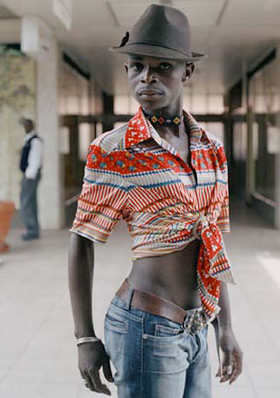Love, Sex, Desire and the (Post)colonial

Dodd will be presenting a paper entitled Seducing ghosts: Unbuttoning the Victorian postmodern in South African contemporary art. In it she will be exploring artworks by Mary Sibande, Nicholas Hlobo and Kathryn Smith, which 'articulate an embodied, physical sense of an entangled cultural inheritance, while acknowledging hidden histories and unspoken desires'.
'Whereas postcolonial studies has tended to privilege historic and economic processes, framing love, sex and desire as a function of the political, my aim here is to explore the power of erotic aesthetics to move audiences beyond the strictures of nationalist discourse towards a shared conception of ourselves as part of the more expansive flows and hybrid encounters of transnational history,' says Dodd.
'In Archive Fever: A Freudian Impression, Jacques Derrida asserts that the archival impulse represents both an attempt to preserve something to be remembered and to leave out something to be forgotten. We are, writes Derrida, 'en mal d'archive' - in need of archives. Bearing in mind Derrida's interpretation of our need to commune with culturally ordained and sequestered fragments of our past as a burning passion, in what ways do these artists' 'counter-archival' grappling with the 19th century disrupt rote thinking about racial and sexual difference in a postcolonial, post-apartheid South Africa seeking more liberating identity configurations for the future?'
The interdisciplinary conference she will be attending is the first of its kind to bring together into productive confrontation issues of love, sex, desire and the postcolonial. It aims to promote collaborative work between academics, activists, and the non-profit community. 'Chicana, Asian, and Black feminists, queer theorists, and creative writers, such as Gloria Anzaldúa, Trin T Minh-ha, Hanif Kureishi, Mahesh Dattani, Audre Lorde, Reinaldo Arenas and Thomas Glave, have called attention to the power of the erotic, queer desire, and love,' reads a statement by the organisers. 'Specifically, these postcolonial authors and critics engage with forms of the affective that incorporate, exceed, threaten or destabilise the political.'
'Special issues of WSQ on "The Global and the Intimate" (2006) and GLQ: A Journal of Lesbian and Gay Studies on "Thinking Sexuality Transnationally" (1999) transgress a narrowly political perspective. Queer Diasporas (2000) explores the mobility of sexuality. Leela Gandhi's Affective Communities (2006), Eve Kosofsky Sedgwick's Touching Feeling: Affect, Pedagogy, Performativity (2002), and Sara Ahmed's work on affect explore new directions for love, sexuality and desire.'
'The affective brings into play questions of sexuality and desire. Given the brutality, legal and extra-legal, directed against homosexuals in the postcolonial world, the issue of homosexuality needs urgent attention. Within postcolonial nationalist discourses, the figure of the homosexual, male or female, is often degraded and aligned with Western perversion in such a way as to secure the moral authority of the postcolonial state,' say the organisers, who chose a portrait by South African photographer Zanele Muholi for the conference's poster and digital media presence.
Love, Sex, Desire and the (Post)Colonialis being co-hosted by Royal Holloway, University of London and the Brunel Centre for Contemporary Writing at Brunel University as well as the Brunel Interdisciplinary Network on Gender and Sexuality, West London.